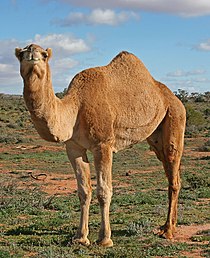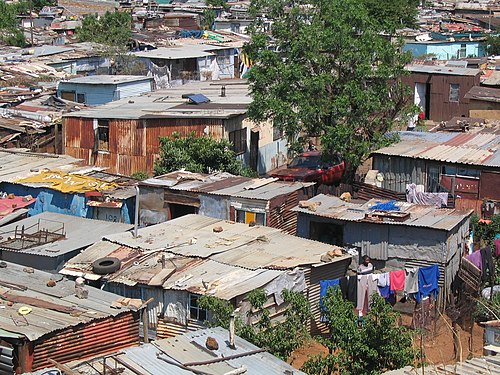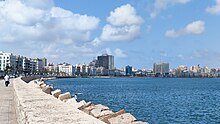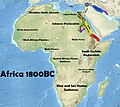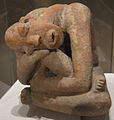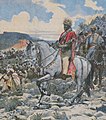Portal:Africa



Africa is the world's second largest and second-most populous continent after Asia. At about 30.3 million km2 (11.7 million square miles) including adjacent islands, it covers 20% of Earth's land area and 6% of its total surface area. With 1.4 billion people0 as of 2021, it accounts for about 18% of the world's human population. Africa's population is the youngest amongst all the continents; the median age in 2012 was 19.7, when the worldwide median age was 30.4. Despite a wide range of natural resources, Africa is the least wealthy continent per capita and second-least wealthy by total wealth, ahead of Oceania. Scholars have attributed this to different factors including geography, climate, tribalism, lack of democracy, corruption, colonialism, the Cold War, and neocolonialism. Despite this low concentration of wealth, recent economic expansion and the large and young population make Africa an important economic market in the broader global context.
Africa straddles the equator and the prime meridian. It is the only continent to stretch from the northern temperate to the southern temperate zones. The majority of the continent and its countries are in the Northern Hemisphere, with a substantial portion and a number of countries in the Southern Hemisphere. Most of the continent lies in the tropics, except for a large part of Western Sahara, Algeria, Libya and Egypt, the northern tip of Mauritania, and the entire territories of Morocco, Ceuta, Melilla, and Tunisia which in turn are located above the tropic of Cancer, in the northern temperate zone. In the other extreme of the continent, southern Namibia, southern Botswana, great parts of South Africa, the entire territories of Lesotho and Eswatini and the southern tips of Mozambique and Madagascar are located below the tropic of Capricorn, in the southern temperate zone.
Africa is highly biodiverse; it is the continent with the largest number of megafauna species, as it was least affected by the extinction of the Pleistocene megafauna. However, Africa also is heavily affected by a wide range of environmental issues, including desertification, deforestation, water scarcity and pollution. These entrenched environmental concerns are expected to worsen as climate change impacts Africa. The UN Intergovernmental Panel on Climate Change has identified Africa as the continent most vulnerable to climate change.
The history of Africa is long, complex, and varied, and has often been under-appreciated by the global historical community. Africa, particularly Eastern Africa, is widely accepted as the place of origin of humans and the Hominidae clade (great apes). The earliest hominids and their ancestors have been dated to around 7 million years ago, including Sahelanthropus tchadensis, Australopithecus africanus, A. afarensis, Homo erectus, H. habilis and H. ergaster—the earliest Homo sapiens (modern human) remains, found in Ethiopia, South Africa, and Morocco, date to circa 233,000, 259,000, and 300,000 years ago, respectively, and Homo sapiens is believed to have originated in Africa around 350,000–260,000 years ago. Africa is also considered by anthropologists to be the most genetically diverse continent as a result of being the longest inhabited. (Full article...)
Selected article –
Race Against Time: Searching for Hope in AIDS-Ravaged Africa is a non-fiction book written by Stephen Lewis for the Massey Lectures. Lewis wrote it in early to mid-2005 and House of Anansi Press released it as a corresponding lecture series began in October 2005. Each of the book's chapters were delivered as a different lecture in a different Canadian city, beginning in Vancouver on October 18 and ending in Toronto on October 28. The speeches were aired on CBC Radio One between November 7 and 11. The author and orator, Stephen Lewis, was at that time the United Nations Special Envoy for HIV/AIDS in Africa and former Canadian ambassador to the United Nations. Although he wrote the book and lectures in his role as a concerned Canadian citizen, his criticism of the United Nations (UN), international organizations, and other diplomats, including naming specific people, was called undiplomatic and led several reviewers to speculate whether he would be removed from his UN position.
In the book and the lectures, Lewis argues that significant changes are required to meet the Millennium Development Goals in Africa by their 2015 deadline. Lewis explains the historical context of Africa since the 1980s, citing a succession of disastrous economic policies by international financial institutions that contributed to, rather than reduced, poverty. He connects the structural adjustment loans, with conditions of limited public spending on health and education infrastructure, to the uncontrolled spread of AIDS and subsequent food shortages as the disease infected much of the working-age population. Lewis also addresses such issues as discrimination against women and primary education for children. To help alleviate problems, he ends with potential solutions which mainly require increased funding by G8 countries to levels beyond what they promise. (Full article...)Featured pictures –
Did you know (auto-generated) -

- ... that in the 1880s Joseph T. Wilson wrote the "most comprehensive study of African American military service" of the era?
- ... that Frank Jeremiah Armstrong, the first African-American graduate of Cornell College, became an assistant to Booker T. Washington?
- ... that the 1928 Austin city plan recommended segregating the city's African American residents to East Austin?
- ... that Godwin Obasi has been described as "Africa's gift to the world of climate science"?
- ... that despite the support of the British authorities, the multi-racial United Tanganyika Party was unsuccessful, with the African-nationalist TANU winning a majority in the 1958–59 election?
- ... that in 1888, Edward P. Duplex became the first African American to be elected a mayor in California?
Categories
Selected biography –

Isaac Folorunso Adewole FAS (born 5 May 1954) is a Nigerian professor of gynaecology and obstetrics. He was minister of health of Nigeria from November 2015 to May 2019 under the Cabinet of President Muhammadu Buhari. He is a former vice-chancellor of the University of Ibadan, and president of the African Organisation for Research and Training in Cancer.
Prior to his appointment as the 11th substantive vice-chancellor of the university, he served as provost at the [[College of Medicine, University of Ibadan]], the largest and oldest medical school in Nigeria. His research interest is in the area of human papillomavirus, HIV, and gynaecologic oncology, a specialised field of medicine that focuses on cancers of the female reproductive system, including ovarian cancer, uterine cancer, vaginal cancer, cervical cancer, and vulvar cancer. Adewole is a member of the governing council of Adeleke University and chairs the National Panel on Cervical Cancer Control Policy.
He is the only Nigerian professor appointed as member of the Council of the Association of Commonwealth Universities. He was appointed to serve as a member of the international advisory board of the African Cancer Institute, a comprehensive cancer centre in sub-Saharan black Africa. (Full article...)Selected country –
 |
 |
||
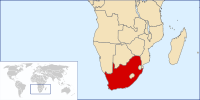
| |||
South Africa, officially the Republic of South Africa, is a country located at the southern tip of the African continent. It borders Namibia, Botswana, Zimbabwe, Mozambique, Swaziland, and Lesotho. South Africa is often called the "Rainbow Nation", a term coined by Archbishop Desmond Tutu and later adopted by then President Nelson Mandela.
South Africa is an ethnically diverse nation with the largest white, Indian, and racially-mixed communities in Africa. Black South Africans, who speak nine officially-recognized languages and many more dialects, account for slightly less than 80% of the population. Racial strife between the white minority and the black majority has played a large part in the country's history and politics, culminating in apartheid, which was instituted in 1948 by the National Party (although segregation existed prior to then). The laws that defined apartheid began to be repealed or abolished by the National Party in 1990 after a long and sometimes violent struggle. (Read more...)
Selected city –
Alexandria (/ˌælɪɡˈzændriə, -ˈzɑːn-/ AL-ig-ZA(H)N-dree-ə; Arabic: الإسكندرية; Greek: Ἀλεξάνδρεια, Coptic: Ⲣⲁⲕⲟϯ - Rakoti or ⲁⲗⲉⲝⲁⲛⲇⲣⲓⲁ) is the second largest city in Egypt and the largest city on the Mediterranean coast. It lies at the western edge of the Nile River delta. Founded in c. 331 BC by Alexander the Great, Alexandria grew rapidly and became a major centre of Hellenic civilization, eventually replacing Memphis, in present-day Greater Cairo, as Egypt's capital. Called the "Bride of the Mediterranean" internationally, Alexandria is a popular tourist destination and an important industrial centre due to its natural gas and oil pipelines from Suez.
The city extends about 40 km (25 mi) along the northern coast of Egypt and is the largest city on the Mediterranean, the second-largest in Egypt (after Cairo), the fourth-largest city in the Arab world, the ninth-largest city in Africa, and the ninth-largest urban area in Africa. (Full article...)In the news
- 12 February 2024 –
- Two boats collide on the Congo River near Kinshasa, Democratic Republic of the Congo; with the death toll remains unclear. (AP)
- 11 February 2024 – 2023 Africa Cup of Nations
- In association football, hosts Ivory Coast win their third Africa Cup of Nations by defeating Nigeria 2–1 in the final. Sébastien Haller scores the winning goal in the 81st minute. (The Guardian)
- 10 February 2024 – Somali civil war
- Four Emirati soldiers and a Bahraini military officer are killed, while ten other people are injured, when a soldier opens fire at a military base in Mogadishu, Somalia, before being killed in the ensuing shootout. Al-Shabaab claims responsibility. (AP)
- 10 February 2024 –
- A Eurocopter EC130 helicopter crashes near Nipton, California, United States, killing all the six people on board, including Nigerian banker Herbert Wigwe. (CBS News)
- 10 February 2024 – 2023–2024 Senegalese protests
- Violent protests occur in Senegal following an announcement by President Macky Sall that presidential elections have been delayed from February 25 to December 15. (Sky News)
- 9 February 2024 –
- At least 18 people are killed during a collision between a bus and a truck on a road in Kinshasa, Democratic Republic of the Congo. (AP)
Updated: 16:33, 14 February 2024
General images -
Africa topics
More did you know –
- ...that Rukwanzi Island, an island in Lake Albert, one of the African Great Lakes, is the subject of a territorial dispute between the Democratic Republic of the Congo and Uganda?
- ...that Oumarou Sidikou, vice-governor of the Central Bank of West African States from 1988 to 1993, was a minister in the government of Nigerien Prime Minister Hama Amadou, which was ousted by a military coup in 1996?
- ...that Jason Dunford, an All-Africa Games gold medalist and runner-up for the 2006 Kenyan Sportsman of the Year award, has a younger brother who was selected "most promising sportsman" at the same awards?
- ...that Sam Mbakwe, governor of Imo State from 1979 to 1983, served in the army of the Republic of Biafra, an Igbo secessionist state in southeastern Nigeria, during the Nigerian Civil War?
Related portals
Major Religions in Africa
North Africa
West Africa
Central Africa
East Africa
Southern Africa
Associated Wikimedia
The following Wikimedia Foundation sister projects provide more on this subject:
-
Commons
Free media repository -
Wikibooks
Free textbooks and manuals -
Wikidata
Free knowledge base -
Wikinews
Free-content news -
Wikiquote
Collection of quotations -
Wikisource
Free-content library -
Wikispecies
Directory of species -
Wikiversity
Free learning tools -
Wikivoyage
Free travel guide -
Wiktionary
Dictionary and thesaurus













